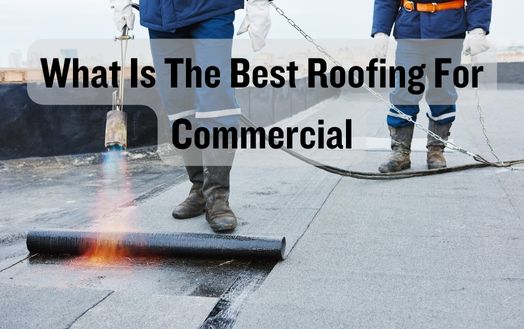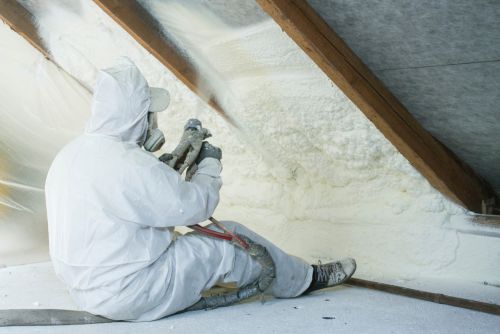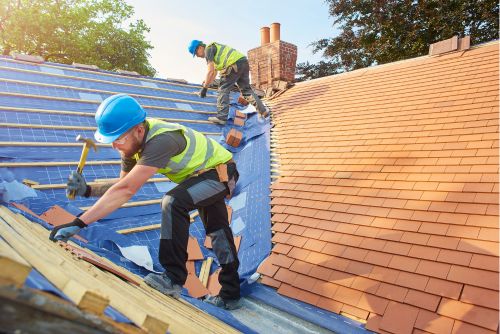
When it comes to finding the perfect roofing solution for commercial buildings, there are a plethora of options available. Each option offers its own unique set of benefits and considerations, making the decision-making process quite nuanced.
From flat roofing to metal roofing, built-up roofing membrane to spray foam roofing, the choices can be overwhelming. However, fear not, as I am here to guide you through this labyrinth of options and help you make an informed decision that suits your specific needs.
So, without further ado, let’s learn more about what is the best roofing for commercial and explore the best options that await.
Flat roofing is economical and durable for commercial buildings. Modern flat roofs offer many innovative options. EPDM rubber roofing and TPO single-ply membranes are popular.
TPO single-ply membranes are UV-resistant and durable due to their thermoplastic blend. This roof reduces cooling costs and is energy efficient. TPO roofs are chemical, puncture, and tear-resistant, making them ideal for commercial buildings.
EPDM rubber roofing is made of synthetic rubber and is weatherproof and durable. EPDM roofs are flexible and can withstand extreme temperatures, making them suitable for many climates. EPDM roofs are easy to install and maintain, saving money over time.
Spray foam roofing is another novel flat roofing option. Spraying a mixture of liquid chemicals over the roof creates a seamless layer. Spray foam roofs insulate all gaps and cracks, reducing air leakage and energy use.

Metal roofing is durable and flexible for commercial buildings. Metal roofing is one of the most innovative commercial roofing options. Durability protects your building, while versatility allows for many design options.
Durability is a major benefit of metal roofing. Metal roofs can withstand hailstorms, high winds, and rain. Metal roofs are durable and require less maintenance than other roofing materials, saving money over time.
Additionally, metal roofing saves energy. Its reflective properties reduce heat absorption, cooling your building and reducing air conditioning needs. This reduces energy costs and makes the building greener.
Besides being durable and energy-efficient, metal roofing is easy to install. This reduces business disruption during roofing installation. Metal roofing is suitable for new construction and retrofitting because it’s lightweight and reduces structural load.
Built-up roofing membrane is a proven commercial roofing solution. It offers several advantages over other commercial roofing materials as an innovative option.
Built-up roofing membranes are durable and reliable for commercial roofing. Businesses seeking long-term building protection choose it for its innovative design and construction. Built-up roofing membranes are a durable option for new or replacement roofs.

Spray foam roofing is versatile and energy-efficient for commercial buildings. Spray foam roofing is my top commercial roofing choice. This innovative roofing system creates a seamless, airtight roof barrier that expands and hardens into a strong foam by combining two liquid components. Spray foam roofing is ideal for commercial buildings with irregular roof structures because it can be customized into any shape or size.
Insulation is a major benefit of spray foam roofing. The foam blocks heat loss in winter, reducing heating needs. Reflecting sunlight and reducing heat transfer keep the interior cool in the summer. Commercial building owners can save a lot on heating and cooling with this energy efficiency.
Another benefit of spray foam roofing is its durability. Expanding foam adheres to the roof surface, creating a seamless, watertight layer. This prevents leaks, a common issue with traditional roofing systems. Spray foam roofing resists wind uplift, making it ideal for storm-prone areas. This roofing system is attractive because it requires little maintenance and can last decades if properly installed and maintained.
TPO roofing is affordable and durable for commercial buildings. TPO roofing offers commercial roofs many benefits with its innovative membrane technology:

EPDM roofing is durable for commercial buildings. EPDM excels in commercial roofing. Ethylene Propylene Diene Monomer (EPDM) is a synthetic rubber that is weatherproof and durable.
UV, ozone, and extreme temperature resistance are EPDM roofing’s main benefits. It is ideal for commercial roofs exposed to harsh weather year-round. Its water resistance makes EPDM roofing ideal for preventing leaks and water damage.
The flexibility of EPDM roofing complements its resistance. This material’s temperature-sensitive expansion and contraction help maintain its integrity. This flexibility makes installation and repair easy for commercial building owners, saving time and money.
White membranes are another EPDM roofing innovation. White EPDM membranes reflect sunlight, cooling the building. This can reduce energy use and improve indoor comfort.
EPDM roofing can last 50 years if properly installed and maintained. Its durability, resistance, and flexibility make it ideal for commercial roofing systems.
EPDM roofing protects your investment for years, whether you need a new roof for your office, retail, or industrial building.
After discussing EPDM roofing’s benefits, we should move on to PVC roofing, another popular commercial option.
Polyvinyl chloride (PVC) roofing is durable and versatile, offering many benefits for commercial roof installations. PVC roofing is one of the best commercial roofing systems for three reasons:

Due to its durability and versatility, modified bitumen roofing is popular for commercial buildings. This novel roof system has many advantages that make it ideal for commercial buildings.
Modified bitumen roofing is asphalt-based and reinforced with fiberglass or polyester. It’s ideal for outdoor commercial buildings due to its strength and weather resistance. Its flexibility, which expands and contracts with temperature changes without cracking or splitting, ensures durability.
A major benefit of modified bitumen roofing is its versatility. It can be torch-applied, cold-applied, or self-adhesive. Based on commercial property needs, this installation flexibility allows customization.
Additionally, modified bitumen roofing has many material options. Multiple layers protect against leaks and punctures. Modified bitumen roofing materials resist UV radiation, reducing sun damage.
Green roofs benefit commercial buildings and are environmentally friendly. Green roofs are becoming more popular as sustainability and energy efficiency become more important.
There are three reasons why green roofing is best for commercial buildings:

Asphalt shingle roofing is becoming more popular for commercial buildings due to its affordability and versatility. Asphalt shingle roofing is a great option for commercial property owners looking for innovative roofing options.
Asphalt shingle roofing is, first and foremost, affordable. Asphalt shingles cost less to buy and install than metal or tile. This makes it appealing to businesses seeking a durable roof at a low cost.
While affordable, asphalt shingle roofing offers many design options. Asphalt shingles are available in many colors, textures, and styles to match your commercial building’s style. Customize your roof to match your brand and create an attractive exterior with this versatility.
Asphalt shingle roofing is easy to maintain. Regular inspections and minor repairs can extend your roof’s life and prevent major issues. Moreover, damaged shingles can be replaced without disrupting the roof system. This ease of maintenance protects your commercial property and minimizes business disruptions.
Commercial buildings benefit from slate roofing’s durability and elegance. Innovative architects and building owners like its natural beauty and durability.
Here are three reasons slate roofing excels in commercial roofing:

Clay tile roofing is ideal for modern commercial buildings due to its beauty and innovation.
The versatility of clay tile roofing is a major benefit. Clay tiles can be bent and molded into endless designs and patterns, unlike metal or flat roofs. Clay tile roofing is ideal for businesses that want a bold exterior.
Clay tile roofing is durable and attractive. These natural clay tiles can withstand high winds, rain, and fire. The security of your commercial building gives you peace of mind that your investment is safe.
Energy efficiency is another benefit of clay tile roofing. Natural insulation regulates temperatures, reducing heating and cooling needs. This reduces energy costs and is environmentally friendly.
Clay tile roofing outperforms PVC, rubber, and EPDM in durability, versatility, and energy efficiency.
Concrete tile roofing is durable and affordable for commercial buildings. Innovative businesses seeking a durable and attractive roof material have turned to it for its strength and versatility.
Concrete tile roofing excels in commercial roofing for three reasons:

Innovative businesses prefer concrete tile roofing for its durability and energy efficiency. So now, let us discover more of solar roofing to know what is the best roofing for commercial establishments.
Solar roofing is the future for commercial roofs. Solar panels, which convert solar power into clean, renewable energy, have become increasingly popular in commercial buildings. Solar roofing delivers sustainable energy and many business benefits.
Solar roofing can significantly lower energy costs. By using solar power, businesses can reduce their energy use and lower their utility bills. Solar roofing systems often have long warranties, so businesses can save for years.
Businesses can also demonstrate their sustainability and environmental responsibility with solar roofing. Companies can reduce their carbon footprint and help the environment by investing in solar energy. This commitment to sustainability can boost a company’s reputation and attract eco-conscious customers.
Over time, solar roofing installation has become more efficient. Modern technology allows solar panels to be seamlessly integrated into commercial roofs, maximizing energy generation while maintaining aesthetics. Many solar roofing companies also provide professional installation, ensuring a smooth and high-quality process.
Synthetic roofing materials are affordable and durable for commercial buildings. These materials are becoming more popular in commercial roofing due to technology. There are three reasons why synthetic roofing materials are ideal for commercial buildings:
In conclusion, the best roofing option for commercial buildings varies depending on various factors such as budget, climate, and aesthetic preferences. Some popular choices include flat roofing for its cost-effectiveness, metal roofing for its durability, and TPO roofing for its energy efficiency.
Ultimately, it’s important to consult with a professional roofer to determine the most suitable option for your specific commercial building needs. So now you know what is the best roofing for commercial buildings.
Installation time depends on the roofing material. The timeline can also depend on commercial space size and project complexity.
These factors should be considered when installing a roof. Professional roofing contractors can provide more accurate material estimates. Their knowledge and experience can streamline installation.
Different roofing materials have different maintenance costs. Consider the material’s durability, weather resistance, and lifespan. Avoiding major issues requires regular inspections and repairs. Certain materials require more frequent maintenance than others.
Roofing experts should help you choose the best option for your commercial property’s needs and budget.
The installation of commercial roofing materials must comply with building codes. These rules protect the building and its occupants.
Building codes typically cover fire resistance, wind uplift resistance, and energy efficiency, depending on location and type.
To comply with these regulations during installation, consult local authorities and roofing professionals.
Consider specific building structures when choosing commercial roofing materials. Commercial buildings cannot use all roofing materials.
The building’s size, shape, and structural integrity may determine its roofing materials. Experts should evaluate these factors and suggest the best commercial roofing options.
Manufacturers often offer warranties on commercial roofing materials. Warranty terms vary by manufacturer and product. They usually cover material or workmanship defects and may cover roofing system repair or replacement.
The manufacturer’s warranty should be reviewed to determine what’s covered and for how long. Some manufacturers offer extended warranties for extra.